Patient StoryJun | 6 | 2024
Gretchen's Story: A Journey Through Genetic Testing, Early Detection, and Preventative Surgery


The discovery of a CDH1 gene mutation in the family led Gretchen Borzi on a journey of genetic testing and preventative surgery with a multidisciplinary team at Mass General Cancer Center.
- "I've always felt very well taken care of by everyone I saw at Mass General Cancer Center for those surgeries and continue to see for follow-ups. They've been both a partner and an advocate for me."
- Gretchen recommends those who have had a gastrectomy check out the advocacy group No Stomach for Cancer or talk to others who have had the surgery. She herself has been a great resource for other Mass General Cancer Center patients.
Gretchen's journey began with a pivotal discovery in her family's medical history—a cousin's diagnosis of stomach cancer that led to genetic testing and counseling and the revelation of a rare CDH1 gene mutation.
People with the CDH1 mutation are more likely to develop hereditary diffuse gastric cancer. This rare cancer syndrome increases the risk of developing two types of cancer:
- Diffuse gastric cancer (DGC), in which cancer cells are scattered throughout the stomach. Since no visible tumor is formed, these cells are hard to detect at an early stage.
- Lobular breast cancer (females), which starts in the lobules (the glands that make breast milk). It's critical to treat this condition before it spreads to the lymph nodes or bloodstream, leading to metastatic breast cancer.
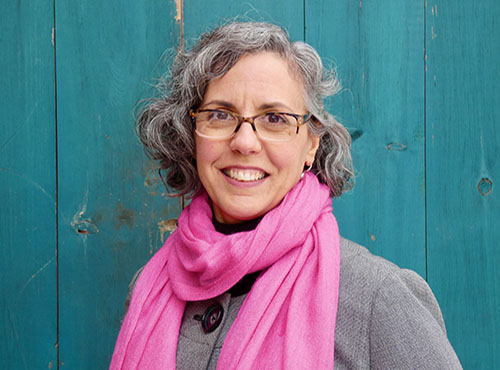
Confronted with the uncertainties of her genetic predisposition, Gretchen, 53, chose proactive screenings for DGC. Eventually, she decided to undergo a prophylactic total gastrectomy (PTG) to pre-empt advanced gastric cancer, followed by a double mastectomy as a preventive measure against breast cancer.
Making it through those ordeals was a huge challenge, physically and mentally. With the support of her medical oncologist, Leif W. Ellisen, MD, PhD, and dedicated multidisciplinary team of experts at Mass General Cancer Center, she emerged with newfound peace, knowing that stomach or breast cancer was unlikely to be part of her future.
"I've always felt very well taken care of by everyone I saw at Mass General Cancer Center for those surgeries and continue to see for follow-ups," said Gretchen, who is married with two children. "They've been both a partner and an advocate for me."
Testing positive for the CDH1 gene mutation
When Gretchen's paternal cousin, the late Jeanne Vanni, was diagnosed with stomach cancer, it prompted concern about the family's cancer history. This led Jeanne to test for the CDH1 gene mutation. She was positive, a discovery with critical implications for many family members.
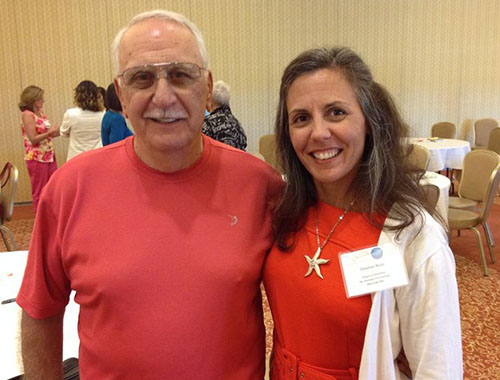
Gretchen's father subsequently tested positive for CDH1. The hospital shared his results with Mass General Cancer Center, where Gretchen went to meet with genetic counselor Devanshi Patel, MS, LCGC. Testing soon confirmed that Gretchen, too, carried the mutation.
Now faced with tough decisions, Gretchen grappled with managing the risk of DGC, which is often diagnosed at stage 4, the most advanced stage of cancer.
Gretchen chose to start with screening for gastric cancer. That involved regular visits to Mass General gastroenterologist Daniel C. Chung, MD, for endoscopies and biopsies.
Even with a skilled doctor like Dr. Chung, though, screening for stomach cancer doesn't have a high degree of reliability. The uncertainty weighed on Gretchen. "It got to the point where I thought, I can't have this hanging over my head for the rest of my life," she said.
She was finally ready to discuss the possibility of having her stomach removed.
The long road to arriving at 'yes'
According to the National Cancer Institute, "individuals who have a CDH1 mutation and a family history of gastric cancer [should] have a total gastrectomy…to eliminate the risk of developing an advanced gastric cancer."
Proceeding with PTG, though, isn't necessarily a clear-cut choice. Not everyone with the CDH1 mutation develops a life-threatening stomach cancer. For women, the lifetime risk is 40-50%.
On the recommendation of Dr. Chung, Gretchen met with Mass General gastrointestinal (GI) surgeon John T. Mullen, MD. During her first visit, Dr. Mullen spent nearly two hours describing the operation and answering Gretchen's questions.
"The first thing I make clear with someone like Gretchen is that this is prophylactic surgery," Dr. Mullen said. "If we go forward, you will virtually eliminate the risk of getting stomach cancer, but you might not have gotten it anyway. That's the unknown."
Over the next nine months, Gretchen did a lot of soul searching. Having two children aged 4 and 6 at the time heavily influenced her thinking.
"I felt that if I missed the opportunity to nip this in the bud before it became something dangerous, I'd regret it so much if I were to develop cancer," she said. "That was really the final push for me to say, 'I can't take that chance.' At that point, I'd asked all the questions I needed to ask and worked through my anger and disbelief. I was really ready."
During their second meeting, Gretchen told Dr. Mullen that she wanted to have the operation.
High-volume expertise in total gastrectomies
Dr. Mullen estimates he has performed nearly 300 total gastrectomies, including nearly 30 PTGs. This means that he is highly experienced in handling the many challenges that may arise, such as removing cancer that has spread to the lymph nodes. He stresses that bariatric surgeons, who perform weight-loss surgery, do not have this type of expertise.
"I tell patients who are in a similar situation as Gretchen that you don't necessarily have to come to me for your total gastrectomy," Dr. Mullen said. "But do make sure you go to a cancer surgeon who does a lot of total gastrectomies for cancer."
After surgery, Gretchen spent six days in the hospital. For the first few days, she couldn't eat or drink anything. Once a test confirmed that her GI tract was functioning well, the care team removed her tubes, and she started eating regular food again.
At home, Gretchen rested while focusing on regaining her strength and learning how to eat again. "It's almost as if you're a baby," she said. "At first, it's very, very small amounts. You have to chew everything a lot more than you normally would, and you can only swallow a little bit at a time."
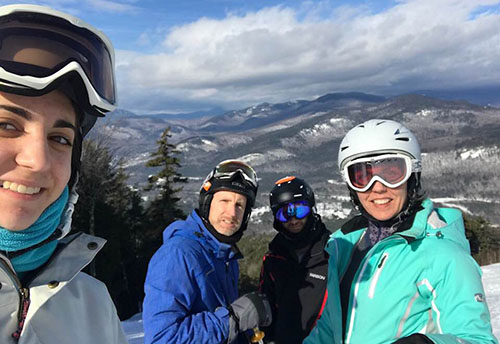
Slowly, Gretchen increased her caloric intake, became more active, and regained weight. Soon she was able to walk around the block without feeling exhausted. Around two months post-surgery, she returned to work. Soon after, she was skiing again.
Although Gretchen was adjusting nicely to life without a stomach, the threat of lobular breast cancer remained. Soon that issue would come to the fore.
Having a double mastectomy was an easier decision
Before and after her PTG, Gretchen followed a regular screening process for breast cancer. She saw Dr. Ellisen, her medical oncologist, every six months, alternating between a mammogram and magnetic resonance imaging (MRI).
During one MRI, a tiny abnormal spot was found in one of Gretchen's breasts. A subsequent biopsy found it might be cancerous. She was referred to Mass General Cancer Center breast surgeon Michelle C. Specht, MD.
"I'd known for a while that there was a risk for breast cancer, so I'd already thought about what I'd do if I tested positive," Gretchen said. "As soon as I was diagnosed, I pretty much knew I wanted to go forward with the double mastectomy. Even though the cancer was in only one breast, the chance of it eventually developing in the other breast was pretty high.
"Having gone through the stomach surgery already, I felt like I should just go ahead and put this behind me. And Dr. Specht supported that."
According to Dr. Specht, two common concerns among women are changes in their appearance after surgery as well as the loss of nerves supplying sensation to the skin, which results in numbness.
Dr. Specht conducted a bilateral nipple-sparing mastectomy (NSM) along with a reconstructive surgeon who completed implant-based reconstruction at the same time. (In 2006, breast surgeons at Mass General Cancer Center developed a new technique for NSM. The center is a national leader in performing this procedure, which preserves all of the skin of the breast, including the nipple and areola.)
"What we're trying to do is give women the best possible quality of life and eliminate that sense of worry," Dr. Specht said. "In Gretchen's case, she doesn't need mammograms or MRIs anymore, and her likelihood of getting breast cancer is very low—probably a 1% lifetime risk."
Leading 'a very normal life'
Today, Mass General Cancer Center remains an important part of Gretchen's life. She still visits Dr. Ellisen once a year for breast cancer screening. In addition, she sees Dr. Chung every three years for colonoscopies to watch for signs of colon cancer. Patel also checks in with her from time and time.
"Devanshi has become a friend," Gretchen said. "She knows everything my family and I have been through, and she's a good resource for us on new testing, new treatments, and other advancements."
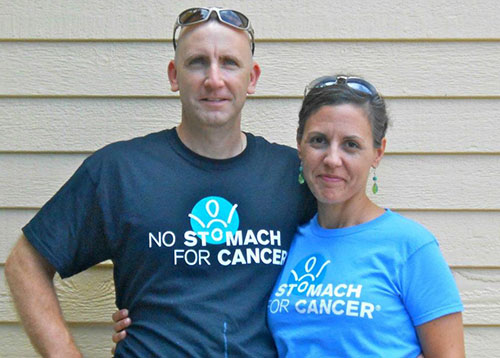
Gretchen now leads what she describes as "a very normal life" with few dietary restrictions. She has learned what foods and drinks to consume and in what portions. "I have three normal-sized meals a day," she said. "There's not a lot going on that would make someone suspect that I don't have a stomach."
To learn what life is like after PTG, Gretchen advises people to check out the advocacy group No Stomach for Cancer and speak with others who have had the surgery. In fact, Dr. Mullen has referred many patients to her for this purpose.
Over a decade since her double mastectomy, Gretchen approaches life with a deep sense of gratitude—particularly with regard to her cousin Jeanne, who died in 2012 due to stomach cancer that had progressed to her colon.
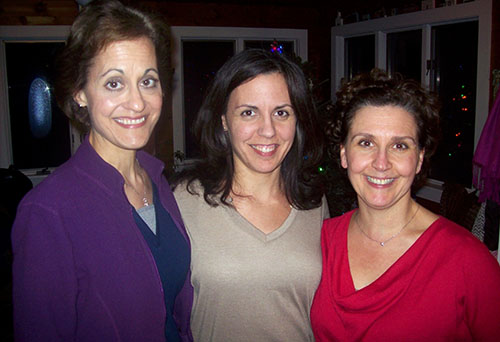
"Had I not known about the CDH1 mutation, I may not even be here right now," she said. "Many women in my family were lost to this cancer by their early 50s. We didn't know it then, but they likely had the mutation. I'm very blessed that I was able to thank Jeanne before she passed for bringing this to light for our family."
Related Programs
Type
Centers and Departments
Topics
Patient Stories
View inspiring cancer survivor stories from Mass General Cancer Center’s community of patients, families, and staff.
Mass General Cancer Center
An integral part of one of the world’s most distinguished academic medical centers, Mass General Cancer Center is among the leading cancer care providers in the United States.
